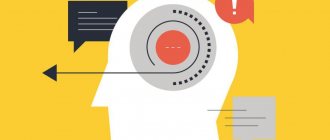Mental processes are a conditional division of the psyche into component elements that allow us to cognize the external and internal world. This is such a complex phenomenon and so little is known about it that there are quite a few definitions and interpretations of this phenomenon.
The development of mental processes occurs in specific conditions of interaction with the outside world: the special properties of our planet, the transition from winter to summer, changes in gravity and much more - put forward certain requirements for a person. Therefore, the psyche acts as a regulator of the body’s behavior.
The functions of mental processes depend entirely on the species. All mental processes can be divided into three types:
Cognitive:
- perception;
- memory;
- thinking;
- sensation;
- imagination;
- performance;
- speech;
- attention.
Emotional:
- feelings;
- emotions;
- stress;
- affects.
Strong-willed:
- will;
- goal setting;
- decision-making.
There is also an inseparable interconnection of mental processes, which is expressed, for example, in the fact that memory is impossible without attention, perception is impossible without memory, and so on. Therefore, if you want to improve the functioning of your mental processes, it will be enough to develop several of them. For example, memory, imagination, emotions and will. However, your list may be completely different. In any case, it should not surprise you that by developing your attention, all other processes immediately “catch up”.
Study methods
In the field of psychiatry and cognitive science, the following methods are used to study the processes of memory, perception, thinking, attention and other functions:
- Recognizing figures by touch and manipulating them tactilely (Seguin board).
- Visual recognition of real, noisy, contour and defocused images (Poppelreiter test).
- Perception of objects requiring visual-spatial processing (contour geographical map, schematic clock).
- Recognizing familiar portraits of famous people.
- Listening perception and assessment of rhythmic structures.
- Detection of memory impairments (Pictogram technique).
It should be said that it is possible to identify a violation of the mental process only with the help of several methods, that is, problems need to be diagnosed in a complex manner.
The largest number of techniques explore thinking. The most famous is “Classification of Objects”, where it is possible to study various aspects of the thinking process. Also known: understanding the figurative meaning of metaphors and proverbs, solving arithmetic problems of varying degrees of complexity, comparing and defining concepts.
Now let's talk separately about the course of mental processes and states, their characteristics, properties and functions.
Human psyche as a system, its structure, components and elements
2.1. Psyche and body. Brain and psyche
Psyche
(from ancient Greek, spiritual) - the ability of a subject to actively reflect objective reality, which arose as a result of the interaction of highly organized living beings with the outside world.
Basic functions of the psyche:
- reflection of the surrounding world;
- ensuring the integrity of the body;
- regulation of behavior.
The integrative function of the psyche is to ensure the body’s adaptation to environmental conditions.
The psyche is the result of the complex activity of the nervous system, the structural and functional unit of which is the neuron (nerve cell).
Neuron
(
from ancient Greek fiber
)
is an electrically excitable cell that processes and transmits information through electrical and chemical signals.
Rice.
2.1. Neuron structure
Each neuron consists of a cell body (or soma
), which contains the cell nucleus.
From the cell body of a neuron grow dendrites
(short branches that receive nerve impulses going to the neuron) and
an axon
(a long thin tubular process that transmits nerve impulses from the neuron).
Neurons form chemical or functional connections with other neurons, making up a neural network
(eng. biological neural network);
points of conjugation (contact) of neurons in the network are called synapses
.
Stimulation of excitatory synapses causes a nerve impulse
, running along the axon.
Signals travel from one neuron to another through a complex electrochemical reaction. The transmission of signals from the sense organs to the brain and spinal cord is carried out by sensory neurons
, and from the brain and spinal cord to the muscles and glands by
motor neurons
.
Nerve
- a sheathed bundle of axons in the peripheral nervous system, which is the path for electrochemical nerve impulses transmitted along each of the axons to the peripheral organs.
Nervous system
humans and mammals consists of
a central nervous system
(
brain
and
spinal cord
) and
a peripheral nervous system
(cranial and spinal nerves, nerve plexuses).
Peripheral nervous system
consists of
the somatic nervous system
and
from the sensory organs, muscles, skin, and
the autonomic
nervous
system
, which regulates the activity of internal organs, glands, blood and lymph vessels.
Brain
- the center of the nervous system, the physiological functions of which are to centrally control all other organs of the body. The brain consists of the central brainstem, limbic system and cerebrum.
Rice.
2.2. Main parts of the brain (cross section)
To the central trunk
relate:
- medulla oblongata
, whose functions include protective reflexes (coughing, sneezing, swallowing, vomiting), vital reflexes (breathing), regulation of vascular tone; - cerebellum
, whose functions are coordination of movements, regulation of balance and muscle tone, muscle memory; - thalamus
, responsible for the redistribution of incoming sensory information (with the exception of smell) to the cerebral cortex; - hypothalamus
, which regulates all body functions (except heart rate, blood pressure and spontaneous respiratory movements), as well as human emotions and behavior.
Reticular formation
(from Latin rete - network) - a structure consisting of more than 100 small neural networks of the brain stem and upper spinal cord that filters incoming sensory information and transmits it to the limbic system and cerebral cortex.
The limbic system located within the thalamus
participates in the regulation of the functions of smell and internal organs, controls instinctive behavioral reactions, emotions, memory, and plays an important role in learning.
Big brain
(cerebrum) consists of two
cerebral hemispheres
, covered with a convoluted
cortex
, which plays a key role in the implementation of higher mental functions - memory, attention, perception, thinking, language and consciousness.
Left hemisphere
The brain specializes in expressive and impressive speech, reading, writing, verbal memory, verbal and abstract thinking, is focused on forecasting,
the right
is responsible for visual-spatial orientation, non-verbal memory, and specific figurative thinking.
Vegetative
(
autonomic
)
nervous system
consists of two systems:
- sympathetic
, which mobilizes the body’s nervous system in stressful situations, increasing metabolism and increasing tissue excitability; - parasympathetic
, whose functions are associated with actions that do not require an immediate reaction (salivation, lacrimation, urination, digestion, defecation).
The autonomic nervous system plays an important role in emotional reactions because its fibers mediate the functioning of smooth muscles and glands. Endocrine glands
(
endocrine glands
) synthesize and release hormones into the bloodstream that affect emotional state and motivation.
The human psyche is influenced by heredity
.
The molecular unit of heredity of a living organism is genes
- sections of DNA and RNA that store information about the creation and maintenance of body cells and transmit genetic characteristics to offspring.
Mental cognitive processes
Let's consider each process separately.
1
Perception
Perception is a holistic reflection of objects and phenomena in the totality of their properties and parts with their direct impact on the senses. It occurs in close relationship with other mental processes: first of all, with sensations that, with the help of sensors, collect information from the outside world, and secondly, with memory, will and attention. Perception is the interpretation of what our sensors have collected.
Perceptual properties include:
- Structurality: an object is perceived by consciousness as a simulated structure abstracted from sensations.
- Objectivity: objects are perceived not as an incoherent set of sensations, but as images that make up specific objects.
- Constancy: constancy of perception of the same object.
- Apperception: perception is influenced by the general content of the human psyche.
- Selectivity: preferential selection of some objects over others (perception here works closely with attention).
2
Memory
Memory is a complex of cognitive abilities for the accumulation, preservation and reproduction of knowledge and skills. Memory is closely related to thinking, perception and sensations.
The main function of memory is to store information, which a person can then use for certain purposes. Without it, we would not have an identity.
The properties of memory include: volume, accuracy, speed of memorization and forgetting processes.
There are different typologies of memory:
- By content: spatial, social, emotional, eidetic, sensory, verbal-logical, figurative.
- By sensory modality: motor, visual, gustatory, auditory, olfactory, eidetic, pain.
- By storage time: long-term, short-term, ultra-short-term.
- According to the organization of memorization: declarative and procedural.
- According to the presence of a goal: voluntary and involuntary.
3
Thinking
Thinking is the process of modeling the patterns of the surrounding world, the highest stage of human information processing. We can say that this is the final mental process that guides the personality.
With the help of thinking, a person can completely change his perception, imagination, attention, will and even sensations. The highest degree of human knowledge.
Basic characteristics of thinking:
- Indirect cognition of objective reality: even on the basis of indirect information we can judge the properties of objects and phenomena.
- Generalization of the reflection of reality: the transition from individual objects to the general.
4
Feel
Sensation is a mental reflection of individual properties and states of the external environment, subjects of external or internal stimuli with the participation of the nervous system.
Canonically, there are five types of sensations: smell, taste, touch, vision, hearing.
Properties of sensations:
- Intensity: a quantitative characteristic of sensations.
- Modality: qualitative description of sensations.
- Duration: temporary characteristic of sensations.
- Localization: spatial characteristics of sensations, information about the location of the stimulus in space.
5
Imagination
Imagination is a person’s ability to create images, ideas and ideas in the mind, as well as to manipulate them. The functions of imagination are to imagine in the head a sample of the future result of an activity in planning, searching for a strategy for solving problems.
Properties of imagination:
- Dream: an emotional image of a desired future that is characterized by little knowledge of how to make it a reality.
- Creativity: creation of new spiritual and material values.
- Agglutination: the creation of new images based on “gluing together” parts of existing images.
- Hallucination: unreal images that a person experiences during illness.
- Emphasis: creating new images by highlighting and emphasizing certain features.
6
Performance
A representation is an image of a phenomenon or object that a person does not perceive here and now. It differs from imagination in that a person is simply trying to remember the image, and not come up with something new.
The functions of representation depend on the type of human activity: artists need to remember the desired image, musicians need to remember the desired melody or sound. Imagination helps to solve complex and imaginative problems, including creative ones.
View properties:
- Fragmentation. The more attractive an object was to a person, the more detail he can imagine it.
- Visibility. A person represents the image of a perceived object exclusively in visual form.
- Generality. The image of an object has a certain information capacity.
- Instability. The image can only be held for a certain amount of time.
7
Speech
Speech is a form of communication between people through linguistic structures. Inherently connected with thinking and presentation.
It helps convey important information to us, as well as convey socio-historical experience.
Properties of speech:
- Clarity. Syntactically correct construction of sentences, the ability to correctly pause or place logical emphasis on the right word.
- Content. The percentage of valuable words expressed in relation to those that are not valuable (the so-called “water”).
- Effectiveness. The influence of speech on the thoughts, will and feelings of other people.
- Expressiveness. Emotional richness, richness and variety of linguistic means.
8
Attention
Attention is the selective focus of perception on a particular object. It is very closely related to memory (some cognitive scientists believe that this is one and the same thing), as well as will.
With the help of will, a person can change his attitude towards an object and pay conscious attention to it, that is, highlight it from the rest. Attention helps a person to successfully navigate the world around him.
By the properties of attention one should mean: volume, direction, concentration, distribution, intensity, switchability and stability.
General concept of the psyche. Forms of manifestation of the psyche and their relationship. Basic functions of the psyche.
Subject, object, tasks of scientific psychology.
Psychology is a science and system of knowledge about patterns, mechanisms, mental facts and phenomena in human life.
the object of psychology is clearly defined - the psyche, and the facts, patterns and mechanisms of the psyche are highlighted as the subject .
Among the diverse manifestations of the psyche, mental processes, mental states, and mental properties of the individual are distinguished.
There are cognitive, emotional, regulatory mental processes. The main function of cognitive processes is to reflect the properties of the external world and the internal characteristics of the body. Cognitive processes inform about the properties and phenomena of the surrounding world, are a source of various knowledge and help to discover the laws of development of nature and society. Cognition has 2 stages: figurative and logical. Imaginative cognitive processes – sensation, perception, representation. The processes of logical cognition include thinking.
Specific tasks of psychology:
1. Clarification of the nature and essence of mental activity and its connection with the brain, the function of which is this activity, its relationship to the objective world.
2. Study of the emergence and development of mental activity in the process of biological evolution of animals and the socio-historical development of human life. Clarification of the common and different in the psyche of people and animals, the characteristics of human consciousness in various social conditions of life.
3. Study of the emergence and development of the child’s psyche, as well as identifying the progressive transformation of the child into a conscious person; identifying how his psychological characteristics are formed in the process of training and education.
4. Study of the structure of human mental activity, the main forms of its manifestation and their relationship.
5. Study of the occurrence of sensations, perception, attention and other reflections of objective reality and how they regulate this reality.
6. Revealing the psychological foundations of teaching and upbringing, studying the qualities and characteristics of a teacher’s personality.
7.Identification and study of the psychological characteristics of various types of industrial, technical, creative and other types of human activity.
8. Study of the characteristics of mental activity of adults and children with defects of the brain and sensory organs.
Basic methodological principles of Russian psychology.
The essence of the scientific approach is expressed in methodological principles , i.e. settings that organize the direction and nature of the research. The psychology of consciousness, with its introspective method, is a subjectivist approach to the study of the psyche. Behaviorism is an example of an objectivist scientific approach to the reality under study: it implements the methodological principle of determinism - the inclusion of behavior in cause-and-effect dependencies on the surrounding world, etc.
The scientific approach in Russian psychology is based on the principles of determinism, the unity of consciousness and activity, the genetic principle, i.e. principle of development.
The relationship between everyday and scientific psychology.
Ideas about psychological phenomena and processes can be of different nature.
On the one hand, a person, as a conscious being, reflects and perceives the influences of the surrounding reality and other people, he thinks, feels and experiences, communicates with other people and influences them, and therefore, in the process of his life and activity, he constantly accumulates mental experience and psychological knowledge. All this is everyday psychology - psychological knowledge gleaned by people from everyday life, from direct interaction with the real world and other people. It usually has the following main distinctive characteristics:
concreteness, i.e. attachment to real situations, specific people, specific tasks of human activity;
intuitiveness, indicating a lack of awareness of their origin and patterns of functioning;
limitation, characterized by a person’s weak ideas about the specifics and areas of functioning of specific psychological phenomena;
reliance on observations and reflections, meaning that ordinary psychological knowledge is not subject to scientific comprehension;
limitations in materials, indicating that a person who has certain everyday psychological observations cannot compare them with similar ones from other people.
On the other hand, a person strives to systematize his ideas about the psyche from a scientific point of view. This is already scientific psychology, that is, stable psychological knowledge obtained in the process of theoretical and experimental study of the psyche of people and animals. They have their own characteristics:
generality, i.e. the meaningfulness of a specific psychological phenomenon based on the specifics of its manifestation in many people, in many conditions, in relation to many tasks of human activity;
rationalism, indicating that scientific psychological knowledge has been maximally researched and understood;
unlimited, i.e. they can be used by many people;
reliance on experiment, when scientific psychological knowledge is studied under various conditions;
weak limitation in materials, meaning that scientific psychological knowledge has been studied on the basis of numerous experiments and often in unique (specially created or specially observed) conditions.
Everyday and scientific psychology are interconnected and perform one function - to improve ideas about the human psyche. However, they play different roles. Everyday psychology only develops psychological ideas, while scientific psychology systematizes them.
General concept of the psyche. Forms of manifestation of the psyche and their relationship. Basic functions of the psyche.
Psyche is a function of the brain that consists in reflecting objective reality in ideal images, on the basis of which the vital activity of the body is regulated.
Functions:
1. Reflection of the influences of the surrounding reality. The subjectivity of mental reflection and the active transformation of what is reflected, characteristic of a person, in no way deny the objective possibility of correctly reflecting the surrounding world. In real life, a person, with the help of his psyche, reflects the influences of reality, records and comprehends them, forming in his mind a real picture of the world, in accordance with which he acts. The mental processes, states, education and properties of people, having a certain flexibility, allow them to adapt to the developing conditions of life and activity, transform them in accordance with their needs and interests.
2. Regulation of behavior and activity. The human psyche and consciousness, on the one hand, reflect the influences of the external environment, adapt to it, and on the other hand, regulate this process, making up the internal content of activity and behavior. The latter cannot but be mediated by the psyche, since it is with its help that a person realizes motives and needs, sets goals and objectives for activities, and develops ways and techniques to achieve its results. Behavior in this case acts as an external form of manifestation of the psyche.
3. A person’s awareness of his place in the world around him. This function of the psyche, on the one hand, ensures correct adaptation and orientation of a person in the objective world, guaranteeing him an effective understanding of all the realities of this world and an adequate attitude towards them. On the other hand, with the help of the psyche and consciousness, a person realizes himself as a person, endowed with certain individual and socio-psychological characteristics, as a representative of a particular society, social group, different from other people and in unique interpersonal relationships with them. A person’s correct awareness of his personal characteristics at the same time helps him adapt to other people, correctly build communication and interaction with them, achieve common goals in joint activities, and maintain harmony in society as a whole.
In everyday life, an individual is understood as a specific person, with all his inherent characteristics.
Mental emotional processes
Let's consider each process separately.
1
Feelings
Feeling is a human emotional process that reflects a subjective evaluative attitude towards abstract or real objects. Feelings manifest differently among people because they are influenced by their own set of individual traits and personality traits. Necessary for communication, friendship and understanding of other people.
Properties of feelings:
- Content: reflection of various aspects, features of the meaning of the objects that cause them.
- Sthenicity: sthenic feelings mobilize a person’s strength, encourage him to active activity (hate, love). Asthenic paralyzes and relaxes (contempt and fear).
- Intensity: strength of feeling.
- Valence: pleasant, unpleasant and ambivalent feelings.
2
Emotions
Emotions reflect a subjective evaluative attitude towards objects, phenomena, situations and people. With the help of will, a person can evoke any emotion that he deems necessary.
The properties of emotions completely coincide with the properties of feelings.
3
Stress
Stress is a set of adaptive reactions of the psyche to stressors.
There is positive (eustress) and negative (distress) stress. The difference is in intensity: the more of it in the psyche, the worse.
4
Affects
Affects are emotional processes of an explosive nature. In many cases they are considered a negative manifestation of the psyche, but in a threatening situation they can save lives.
Mental volitional processes
Let's consider each process separately.
1
Setting a goal
Goal setting is the process of selecting one or more goals. Closely related to willpower and emotions.
2
Will
Will is the ability of a person to make a decision based on the thought process and direct his actions and thoughts in accordance with the decision made.
As follows from the definition, will is closely related to thinking and decision-making. But, besides this, without it conscious attention and developed memory are impossible.
3
Making decisions
Decision making is a mental process that is characterized by the use of willpower to set a goal and a firm intention to achieve it.
The concept of “human psyche”.
To begin with, I would like to understand what the concept of “psyche” includes. If we look in the dictionary, we will find several definitions. In my opinion, this statement is more capacious and accurate: the psyche is a special aspect of the life activity of animals and humans and their interaction with the environment. We are, of course, interested in the part that is connected with the person. And, therefore, it is worth citing one more definition given in the scientific literature: the psyche is the ability to actively reflect reality or a set of mental processes and phenomena (perception of information, subjective sensations, emotions, memory, etc.).1 Thus, we We came to the next part of the work, which describes the structure of the human psyche.
Development of mental processes
When they talk about the development of mental processes in children, the first thing they distinguish is their age group.
From 2 to 6 years of age, the child develops mental processes. Parents can influence this if they coach them. Here are exercises you can give your children:
- Place some toys on the table. The child must remember their location and presence. Then he closes his eyes and you remove or move one of them. He must say what has changed.
- When your child has mastered this exercise, make it more difficult. Remove 2 or 3 toys.
- The following game is suitable for developing thinking: place four pictures in front of the child, where three of them relate to a specific topic. The child must guess which one is extra.
- When going to the store, give your child a list of products (3-4 to start with) to memorize. In the store he must remember them (long-term memory is trained).
If your child is 7-8 years old, he should be able to:
- Find 10 differences between objects.
- Complete the task without distraction for about 15-20 minutes.
- Copy a movement or pattern exactly.
- Complete tasks independently according to the proposed sample.
- Be able to find identical objects.
- Be able to sequence events and compose a coherent story using pictures.
- Build a logical series from a specific group of objects.
- Repeat verbatim sentences consisting of 7-8 words.
The mental processes of an adult are formed at the age of 16. But this does not mean that they cannot be trained and improved. In fact, thinking can and even needs to be developed throughout life. Therefore, in conclusion of the article, we suggest that you take one of our courses (or all of them):
- Memory development
- Logical thinking.
- Emotional intellect.
- Cognitive science
Also, be sure to practice by solving problems from our “Games, Challenges and Entertainment” section.
We wish you good luck!
We also recommend reading:
- Storytelling
- Exercises for memory development in preschoolers
- Spheres of personality
- Cognitive processes
- Cognitive psychology and cognitive psychotherapy
- Cognitive sphere of personality
- Two important laws of memory
- Sensations: what they are and what they are like
- Sensation and perception
- Human attention: what it is and how it works
- Intelligence and its development: several recommendations
Key words:1Self-knowledge










